 24 citations,
October 1994 in “Fertility and Sterility”
24 citations,
October 1994 in “Fertility and Sterility” People with hair loss may have different levels of certain hormones due to changes in hormone processing.
 22 citations,
November 2008 in “International Journal of Dermatology”
22 citations,
November 2008 in “International Journal of Dermatology” A mix of 5-aminolevulinic acid and iron ion can speed up hair growth.
 21 citations,
May 2016 in “The Cochrane library”
21 citations,
May 2016 in “The Cochrane library” Topical minoxidil helps treat female pattern hair loss, but more research needed for other treatments.
[object Object] 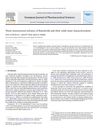 21 citations,
October 2009 in “European Journal of Pharmaceutical Sciences”
21 citations,
October 2009 in “European Journal of Pharmaceutical Sciences” Three new finasteride solvates found, change forms under different drying conditions.
 19 citations,
June 2019 in “Clinical Drug Investigation”
19 citations,
June 2019 in “Clinical Drug Investigation” Platelet-rich plasma injections significantly improve hair density and thickness in both male and female pattern hair loss, especially in early stages.
 19 citations,
May 2016 in “Clinical, cosmetic and investigational dermatology”
19 citations,
May 2016 in “Clinical, cosmetic and investigational dermatology” FGF-2&D/P nanoparticles can help treat hair loss.
 19 citations,
March 2008 in “Nature clinical practice endocrinology & metabolism”
19 citations,
March 2008 in “Nature clinical practice endocrinology & metabolism” A combined drug and laser treatment improved hirsutism in a PCOS patient, also enhancing her heart health and requiring regular liver and kidney checks.
[object Object]  19 citations,
May 1992 in “International Journal of Dermatology”
19 citations,
May 1992 in “International Journal of Dermatology” Some alternative vitiligo treatments show promise, but none are as effective as psoralens and UVA.
 18 citations,
January 2017 in “Journal der Deutschen Dermatologischen Gesellschaft”
18 citations,
January 2017 in “Journal der Deutschen Dermatologischen Gesellschaft” High and low doses of prednisolone helped 62% of children with severe alopecia regrow hair with some weight gain and mild acne as side effects.
 18 citations,
March 2002 in “The journal of investigative dermatology/Journal of investigative dermatology”
18 citations,
March 2002 in “The journal of investigative dermatology/Journal of investigative dermatology” Estrogen increases blood vessel growth factor production, while testosterone blocks this increase.
 16 citations,
February 2018 in “Journal of Cosmetic Dermatology”
16 citations,
February 2018 in “Journal of Cosmetic Dermatology” Carboxytherapy may help increase hair growth in alopecia patients but requires ongoing treatment.
 16 citations,
August 2015 in “Journal of Experimental & Clinical Cancer Research”
16 citations,
August 2015 in “Journal of Experimental & Clinical Cancer Research” The photolyase-based device significantly changed the size and heat of potential skin cancer areas in patients.
 15 citations,
May 2016 in “Archives of Dermatological Research”
15 citations,
May 2016 in “Archives of Dermatological Research” ULBP3 could be a marker for diagnosing alopecia areata incognita and may be linked to its cause and development.
 14 citations,
December 2007 in “Pediatric allergy and immunology”
14 citations,
December 2007 in “Pediatric allergy and immunology” Newborns with the common rash Erythema Toxicum have many active mast cells in their skin, but these cells don't produce the LL-37 peptide.
 13 citations,
January 2020 in “Neuroscience”
13 citations,
January 2020 in “Neuroscience” Blocking 5α-reductase can harm memory and brain structure, and increase harmful brain changes in male mice used for Alzheimer's disease research.
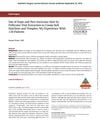 13 citations,
September 2015 in “Aesthetic Surgery Journal”
13 citations,
September 2015 in “Aesthetic Surgery Journal” Transplanting hair from the nape and around the ear to the hairline and temples generally satisfies patients and looks natural.
 13 citations,
March 2013 in “International Journal of Cosmetic Science”
13 citations,
March 2013 in “International Journal of Cosmetic Science” AcSDKP may help prevent skin and hair aging and promote their growth.
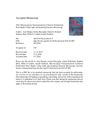 12 citations,
July 2016 in “Forensic science international”
12 citations,
July 2016 in “Forensic science international” The research found that postmortem root bands in hair are likely caused by the breakdown of a specific part of the hair's inner structure after death.
 11 citations,
January 2015 in “Journal of The European Academy of Dermatology and Venereology”
11 citations,
January 2015 in “Journal of The European Academy of Dermatology and Venereology” Hair loss gene linked to prostate issues.
 10 citations,
January 2013 in “Journal of The European Academy of Dermatology and Venereology”
10 citations,
January 2013 in “Journal of The European Academy of Dermatology and Venereology” The home-use IPL device effectively reduced hair and delayed its regrowth after six months of use, with users happy and no negative side effects.
 10 citations,
May 2012 in “Journal of Craniofacial Surgery”
10 citations,
May 2012 in “Journal of Craniofacial Surgery” Cerament effectively corrected forehead irregularities in one patient, and various surgical techniques successfully reconstructed perioral soft tissue in 14 patients.
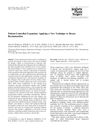 10 citations,
April 2007 in “Aesthetic Plastic Surgery”
10 citations,
April 2007 in “Aesthetic Plastic Surgery” The new patient-controlled expansion technique for breast reconstruction is safe, efficient, and cost-effective.
 10 citations,
June 2001 in “International Journal of Cosmetic Science”
10 citations,
June 2001 in “International Journal of Cosmetic Science” Natural shampoos made in the lab conditioned hair better than commercial ones with chemicals.
 8 citations,
October 2022 in “Dermatology practical & conceptual”
8 citations,
October 2022 in “Dermatology practical & conceptual” Tofacitinib and ruxolitinib are effective and safe for treating various autoimmune skin and joint disorders.
 8 citations,
October 2017 in “Dermatology practical & conceptual”
8 citations,
October 2017 in “Dermatology practical & conceptual” A spermidine-based supplement may help hair grow longer by keeping it in the growth phase.
 7 citations,
July 2019 in “International journal of research in dermatology”
7 citations,
July 2019 in “International journal of research in dermatology” Intralesional triamcinolone acetonide is more effective than platelet-rich plasma for treating scalp alopecia areata.
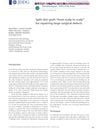 7 citations,
August 2015 in “Journal der Deutschen Dermatologischen Gesellschaft”
7 citations,
August 2015 in “Journal der Deutschen Dermatologischen Gesellschaft” Scalp-to-scalp skin grafts quickly heal and hide well under regrown hair, making them good for repairing large scalp defects.
 7 citations,
June 2011 in “Movement Disorders”
7 citations,
June 2011 in “Movement Disorders” A specific gene mutation is linked to a hereditary form of dystonia that responds well to certain medications.
 6 citations,
March 2014 in “Herba Polonica”
6 citations,
March 2014 in “Herba Polonica” Plant extracts may help treat hormone-related hair loss.
 6 citations,
October 1993 in “The journal of the Royal Society of Health”
6 citations,
October 1993 in “The journal of the Royal Society of Health” Children's hair loss has many causes and requires careful diagnosis and personalized treatment, including emotional support.






























